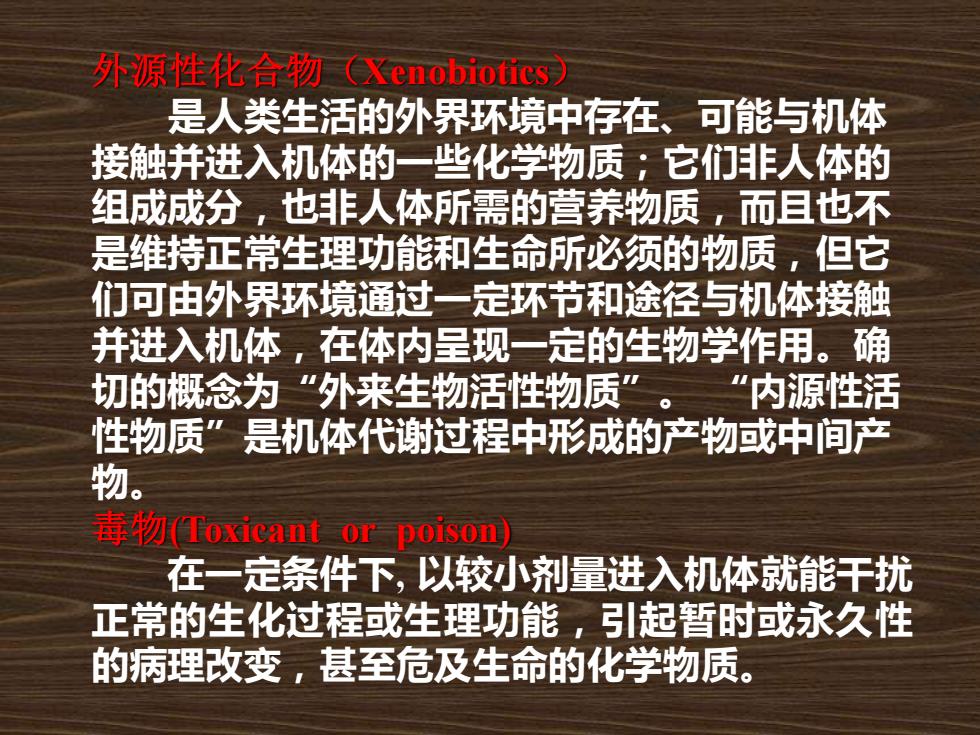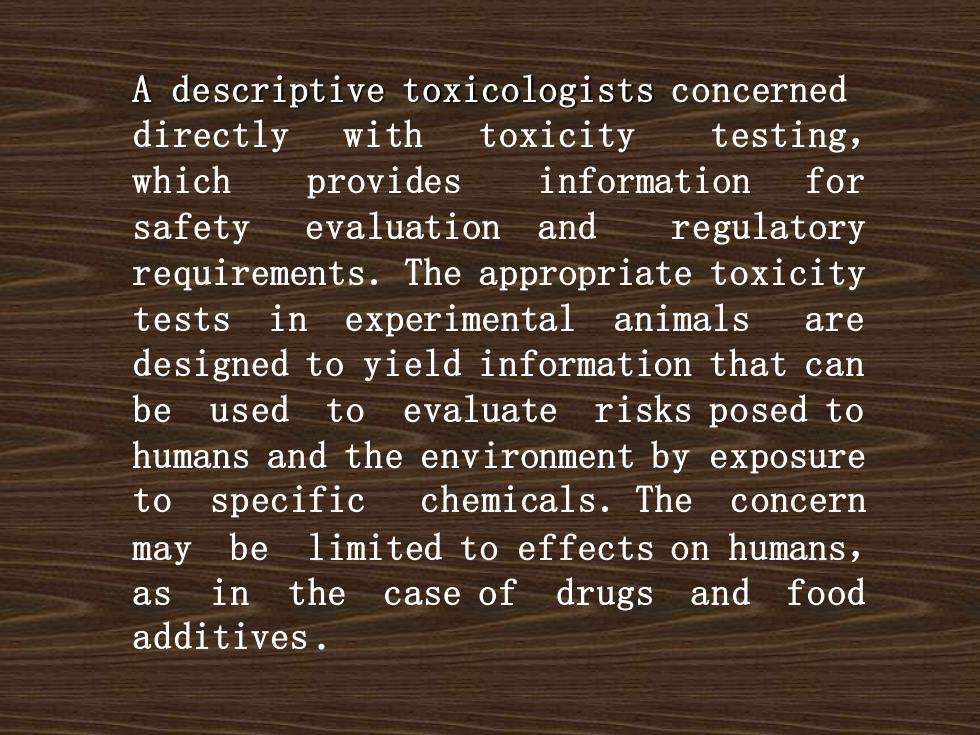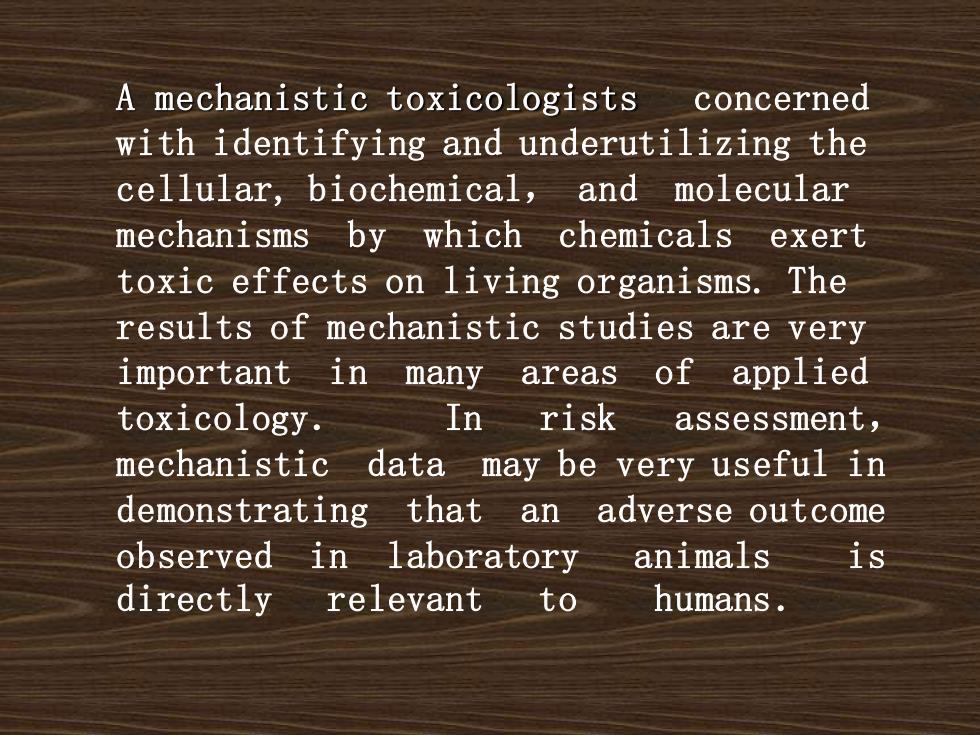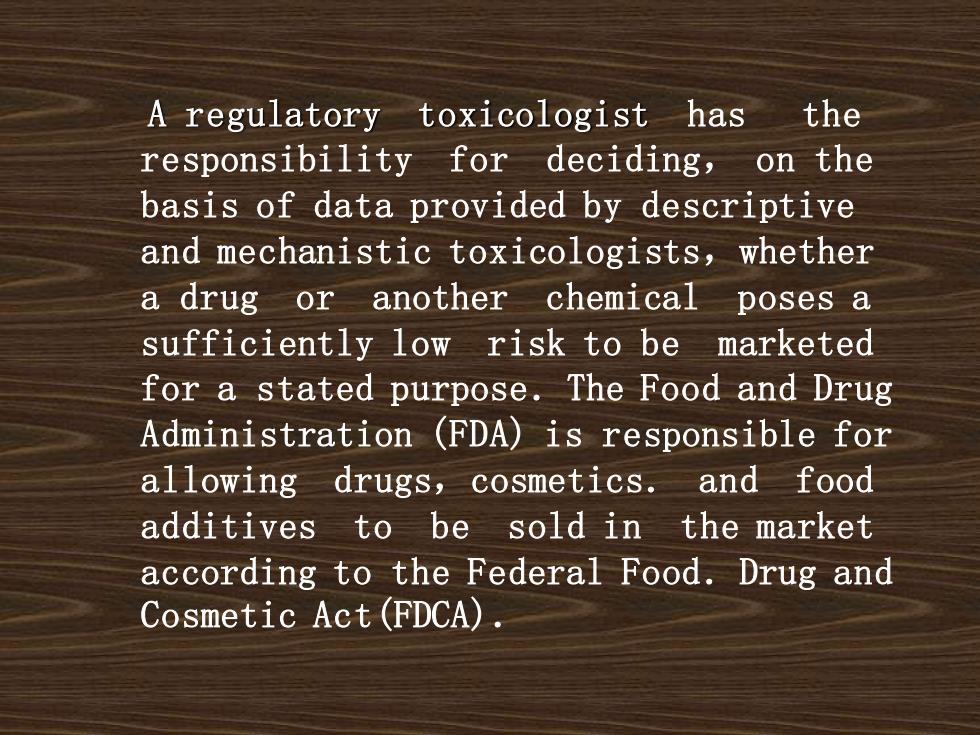
外源性化合物(Xenobiotics) 是人类生活的外界环境中存在、可能与机体 接触并进入机体的一些化学物质;它们非人体的 组成成分,也非人体所需的营养物质,而且也不 是维持正常生理功能和生命所必须的物质,但它 们可由外界环境通过一定环节和途径与机体接触 并进入机体,在体内呈现一定的生物学作用。确 切的概念为“外来生物活性物质”。 “内源性活 性物质”是机体代谢过程中形成的产物或中间产 物。 毒物(Toxicant or poison) 在一定条件下, 以较小剂量进入机体就能干扰 正常的生化过程或生理功能,引起暂时或永久性 的病理改变,甚至危及生命的化学物质
外源性化合物(Xenobiotics) 是人类生活的外界环境中存在、可能与机体 接触并进入机体的一些化学物质;它们非人体的 组成成分,也非人体所需的营养物质,而且也不 是维持正常生理功能和生命所必须的物质,但它 们可由外界环境通过一定环节和途径与机体接触 并进入机体,在体内呈现一定的生物学作用。确 切的概念为“外来生物活性物质”。 “内源性活 性物质”是机体代谢过程中形成的产物或中间产 物。 毒物(Toxicant or poison) 在一定条件下, 以较小剂量进入机体就能干扰 正常的生化过程或生理功能,引起暂时或永久性 的病理改变,甚至危及生命的化学物质

近年来毒理学从单纯研究毒物的学科,飞 速发展成为一门现代化的综合性学科。毒理学 是药理学发展和分化而来,二者既有共性又有 特点。毒理学与药理学有相同的理论基础和研 究方法,其主要区别在于药理学着重研究药物 对疾病的有效作用及有效剂量,而毒理学则着 重于探讨化学毒物对机体的危害及避免危害的 安全剂量。毒理学主要分为三个研究领域,即 描述毒理学(descriptive toxicology)、 机制毒理学(mechanistic toxicology)、 管理毒理学(regulatory toxicology)
近年来毒理学从单纯研究毒物的学科,飞 速发展成为一门现代化的综合性学科。毒理学 是药理学发展和分化而来,二者既有共性又有 特点。毒理学与药理学有相同的理论基础和研 究方法,其主要区别在于药理学着重研究药物 对疾病的有效作用及有效剂量,而毒理学则着 重于探讨化学毒物对机体的危害及避免危害的 安全剂量。毒理学主要分为三个研究领域,即 描述毒理学(descriptive toxicology)、 机制毒理学(mechanistic toxicology)、 管理毒理学(regulatory toxicology)

A descriptive toxicologists concerned directly with toxicity testing, which provides information for safety evaluation and regulatory requirements.The appropriate toxicity tests in experimental animals are designed to yield information that can be used to evaluate risks posed to humans and the environment by exposure to specific chemicals.The concern may be limited to effects on humans, as in the case of drugs and food additives
A descriptive toxicologists concerned directly with toxicity testing, which provides information for safety evaluation and regulatory requirements.The appropriate toxicity tests in experimental animals are designed to yield information that can be used to evaluate risks posed to humans and the environment by exposure to specific chemicals.The concern may be limited to effects on humans, as in the case of drugs and food additives

A mechanistic toxicologists concerned with identifying and underutilizing the cellular, biochemical, and molecular mechanisms by which chemicals exert toxic effects on living organisms. The results of mechanistic studies are very important in many areas of applied toxicology. In risk assessment, mechanistic data may be very useful in demonstrating that an adverse outcome observed in laboratory animals is directly relevant to humans.
A mechanistic toxicologists concerned with identifying and underutilizing the cellular, biochemical, and molecular mechanisms by which chemicals exert toxic effects on living organisms. The results of mechanistic studies are very important in many areas of applied toxicology. In risk assessment, mechanistic data may be very useful in demonstrating that an adverse outcome observed in laboratory animals is directly relevant to humans.

A regulatory toxicologist has the responsibility for deciding, on the basis of data provided by descriptive and mechanistic toxicologists,whether a drug or another chemical poses a sufficiently low risk to be marketed for a stated purpose.The Food and Drug Administration (FDA) is responsible for allowing drugs,cosmetics. and food additives to be sold in the market according to the Federal Food.Drug and Cosmetic Act(FDCA).
A regulatory toxicologist has the responsibility for deciding, on the basis of data provided by descriptive and mechanistic toxicologists,whether a drug or another chemical poses a sufficiently low risk to be marketed for a stated purpose.The Food and Drug Administration (FDA) is responsible for allowing drugs,cosmetics. and food additives to be sold in the market according to the Federal Food.Drug and Cosmetic Act(FDCA).